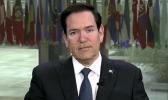מארקא רוביא זאגט אז סטודענט וויזעס קענען אייביג ווערן אפגעזאגט


Senator Marco Rubio emphasized the United States’ authority to deny or revoke student visas for individuals whose presence threatens national security, reaffirming that no one is automatically entitled to enter the country. Speaking in a recent interview, Rubio explained that visas are granted at the discretion of consular officers and can be denied for a variety of reasons, including suspicion of overstaying, criminal associations, or links to terrorist organizations.
“No one is entitled to a student visa to enter the United States. No one. It’s not a constitutional right. It’s not guaranteed by law,” Rubio stated, highlighting that the burden of proof lies with the applicant, not the government. He noted that consular officers routinely deny visas worldwide for valid concerns, and national security remains a paramount consideration.
Rubio specifically addressed the threat posed by applicants who support Hamas, stating that any indication of such affiliations during the visa interview would be grounds for denial. Moreover, if such support becomes evident after entry, the visa should be revoked. “If we later discover information that would have led to denial in the first place, that’s grounds for revocation,” Rubio explained.
The senator underscored that allowing individuals who promote or excuse terrorist organizations onto U.S. campuses is contrary to both national security and foreign policy interests. Rubio stressed that the U.S. has the right—and responsibility—to protect its citizens by ensuring that foreign students are not contributing to or endorsing groups committed to violence and destruction.
Rubio’s remarks reinforce the government’s ongoing efforts to maintain strict screening procedures for student visas, prevent exploitation of U.S. educational institutions by terrorist sympathizers, and safeguard both campuses and the broader national interest. He concluded by affirming that the policy framework allows for proactive denial as well as revocation of visas when threats are identified.
גאלערי
ווידעאס